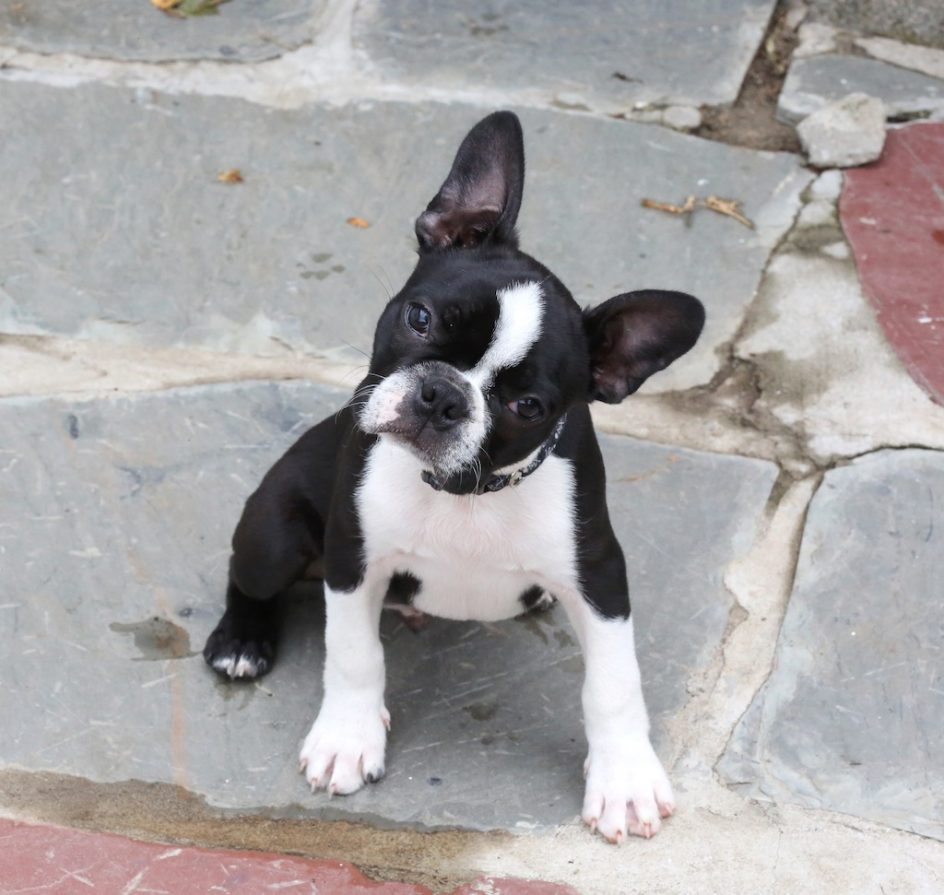
Gus is now twelve weeks old, the age when some small dog breeders release their puppies into the world (large dogs go sooner). He will grow rapidly in the next few weeks, begin to develop stronger bladder control and enter a critical period of socialization.
People whose dogs have behavioral problems often tend to blame abuse, but behaviorists have documented the fact that dogs who are not socialized in that period, do not get to meet different kinds of people in different situations often become fearful, withdrawn, even aggressive – these are often the symptoms attributed to abuse.
Gus loves people and has been socialized beyond imagination, people every where around here want to touch him. He stays at the dentist when I’m there, greets shoppers at the Farmer’s Market – it takes a long time to move through there, hangs out at the Round House Cafe, is a favored attraction at Battenkill Books, and on Main Street, has done three therapy visits to the Mansion.
I want to do more socialization. You can never really get enough.
This is the period during which the dog develops many of his or her attitudes towards other dogs, people and the world. Soon, we will stop getting up at 3 a.m. to take him out of his crate, he will be able to get through the night.
People with older dogs try to socialize them years after puppy hood. It is very difficult to do, anybody who says otherwise is probably trying to get you to spend money.
Gus’s digestive system will change also and he is entering the period of focus and concentration where more advanced training can begin – lie down, come, stay and sit. He sits on command reliably now, and mostly comes when called. This is period of change, it is visible every day.
He is beginning to look like an old soul.
When I talk to him or say his name, he looks me in the eye and tilts his head (above), a great sign for training. Dogs that know their names and respond to human voice are the trainable ones, they can’t learn if they are never paying attention. And many dogs do not know their names and won’t respond to them.
At this age, Gus may suddenly become terrified of things he didn’t notice before – trucks, airplane sounds, the sudden movement of sheep. They are traditionally sensitive in this period about loud noises. That will pass. Gus will get even more playful, if such a thing is possible, but he will rest more frequently.
The more he gets outside, and around, and in the car, the better off he will be.
Gus will still need to be taken out frequently – he just can’t control his bladder for too long, and he will get mouthy, and needs plenty of available and appropriate things to chew on. He does not need for me or Maria to be a loud noise.
I’m going to step up the therapy dog training, this is an age when he can “get” more sophisticated ideas and requests. Although vets suggest that this is a good time to teach a dog his name, Gus knows his very well. We are fortunate to both be working at home all day.
I remind myself that positive reinforcement training is especially critical at this state.
We all may lose our tempers from time to time, I certainly do but this is a time to be especially gentle and understanding. By 16 weeks, Gus will mostly be who he is going to be, it is very difficult to change the natural and learned behaviors of an older dog we know nothing about.
Training should be brief, occur at a regular time, clear and fun. Commands should be given in one or sometimes two words ”sit,” “stay,” “lie down.” If he blows me off, I wait several minutes and try again. I never shout at him, run towards him, or jerk on his leash.
These are the weeks when he gets his final shots and tests. In a month, he will be almost fully formed.
We are in a good place. Gus is a bit less cute than he was two weeks ago, I think, and more of a dog. He is eager to go out, and happy to come in. He loves being with the other dogs and he is always checking on me and Maria. We rarely pick him up, and he never gets to sit up in our lap or on furniture. Given the breed, that may change, but we will try not to make it a tradition or a habit.
He completely gets the idea of rest and quiet in my study. As I write this, he is lying by my feet, next to Red. He is at ease on the car, and ides on the back seat or on the floor in back.
The different stages of development for a puppy are well known and critical to training and behavior. They can be Googled online or discussed with the vet.
